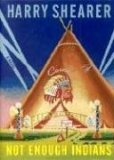
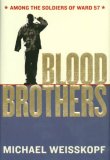
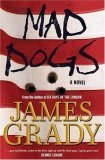
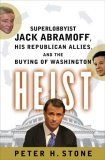
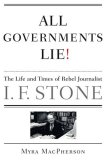
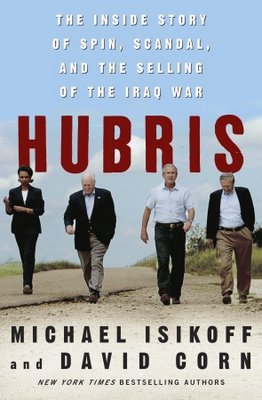
Sharp-eyed readers of this blog by now might have picked up on the subtle hints that I have a new book out and that I am hoping that every visitor to this site buys at least three copies. This has been a tough season for authors. The publishing industry has released a flood of books this fall. That means more competition for precious media bookings, for the small number of slots on the bestseller lists, and, most important, for the attention of potential customers and readers. Even books that don't compete directly with serious works--say, former New Jersey Governor James McGreevey's screw-and-tell memoirs--suck up available space on media outlets and at the front tables in the chain bookstores.
Hubris has been doing well in this difficult environment, hitting the bestseller lists of The New York Times, The Washington Post, and The Boston Globe. It was No. 1 for a while on Amazon.com. But there are plenty of other good books out now that you should be purchasing--and several are written by friends of mine. So instead of plugging my own, let me flack their works. So buy these books:
* All Governments Lie by Myra MacPherson. When I was in college, I couldn't decide whom I wanted to be when I grew up: Jack Kerouac or I.F. Stone. I did end up writing a novel (see below). But more important, I now hold a post--Washington editor of The Nation--that once belonged to Izzy Stone, one of the best independent American journalist of the latter half of the 20th Century. Izzy, some like to say, was a blogger before blogs. For years, he opted out of organized media and sent out (that is, sold) a weekly newsletter to tens of thousands of subscribers. He showed what one smart fellow could do on his own when it came to digging out truths and presenting analyses missed by the rest of the media. He remains an inspiration (despite the right's never-ending attempts to smear him as a Soviet agent). MacPherson, who once was a reporter for The Washington Post, chronicles his life and casts Stone as a model (and lesson) for the journalists of today.
* Heist by Peter Stone. Speaking of Izzy Stone, one of the better muckrakers in Washington these days is his nephew, Peter Stone, a reporter at National Journal. Because the NJ is a fancy, high-priced magazine originally designed to serve those willing to pay top-dollar for quality journalism explaining the workings of Washington (say, lobbyists and libraries), many Americans are unfamiliar with its work. Stone has been writing about the sleazy world of Washington lobbydom for years. Consequently, he was well-positioned to cover the rise and fall of Jack Abramoff and his Republican buddies. If you want to know how lobbying (for Indian gaming and other matters) really works, turn to Stone.
* Blood Brothers by Michael Weisskopf. On the night of December 10, 2003, Weisskopf, a correspondent for Time was riding with a US military convoy in northwestern Baghdad. He was there to contribute to his magazine's cover story declaring the US soldier in Iraq the Person of the Year. But he became part of the story. An RPG landed in his vehicle. Not realizing what the object was but working on pure instinct, he grabbed for it, intending to hurl it far from the truck. He immediately felt the red-hot object burning through the flesh of his right hand. Before he could react, the device exploded. Weisskopf and the soldiers riding with him survived--most likely because his hand muffled the blast. But that hand was gone. When Weisskopf came to moments after the blast, the end of his arm looked like a decapitated chicken. He worried he was going to die. He didn't. Instead, he ended up in Ward 57 at Walter Reed Medical Center, a wing reserved for Iraqi war amputees. This book recounts the painful rehabilitation and reentry into normal life of Weisskopf and other Ward 57 patients. It's a close-up and personal look at one cost of the war--a cost that doesn't get much attention. Credit to Weisskopf for not obsessing with his own tale and focusing on that of the soldiers that drew him to Iraq and his new life.
* Mad Dogs by James Grady. Over the past fifteen years, I've had the immense pleasure of being a pal of the fellow who wrote Six Days of the Condor (which became the film Three Days of the Condor). It is in large part because of Grady that I also have had something of a career as a fiction writer. (See Deep Background, my 1999 novel). In Grady's latest thriller, five former CIA operatives who each went psycho due to a mission gone bad (one nearly infiltrated a pre-9/11 meeting of al Qaeda terrorists that included two of the hijackers-to-be) bust out of the high-security mental hospital set up by the agency to house its basket-cases. Their self-assigned mission: to find out why their shrink was brutally murdered within their ward. The book is a fast-paced road-trip of covert-op crazies trying to come to terms with their personal histories and the internal bureaucratic intrigue of the post-9/11 intelligence establishment. If real-life intelligence screw-ups are not thrilling enough for you, try this smart action novel of espionage and angst.
*Not Enough Indians by Harry Shearer. Shearer would make the original Renaissance Man look like a slouch. He does umpteen voices on The Simpsons (including Mr. Burns), produces a weekly radio show of political satire (Le Show), writes the "Eat the Press" column at HuffingtonPost.com, and regularly appears in Christopher Guest's films (The Mighty Wind). He is also renowned for his membership in a band called Spinal Tap. Clearly, this fellow has too much time on his hands. To fill up those lonely downtime moments, he wrote his first novel. It's--no surprise--a comedy. The book tells the story of a down-on-its-luck town in upstate New York that fails to entice a Walmart and then goes "tribal"--that is, it petitions the federal government to certify itself as an Indian tribe in order to win the right to open a casino. Soon the town is home to the biggest "gaming" (as the industry calls it) operation in America. And hijinks ensue. Shearer's writing is reminiscent of Garrison Keillor's accounts of his fictitious Lake Wobegone but--again, this is no surprise--with much more of an edge.
Posted by David Corn at October 23, 2006 12:06 PM